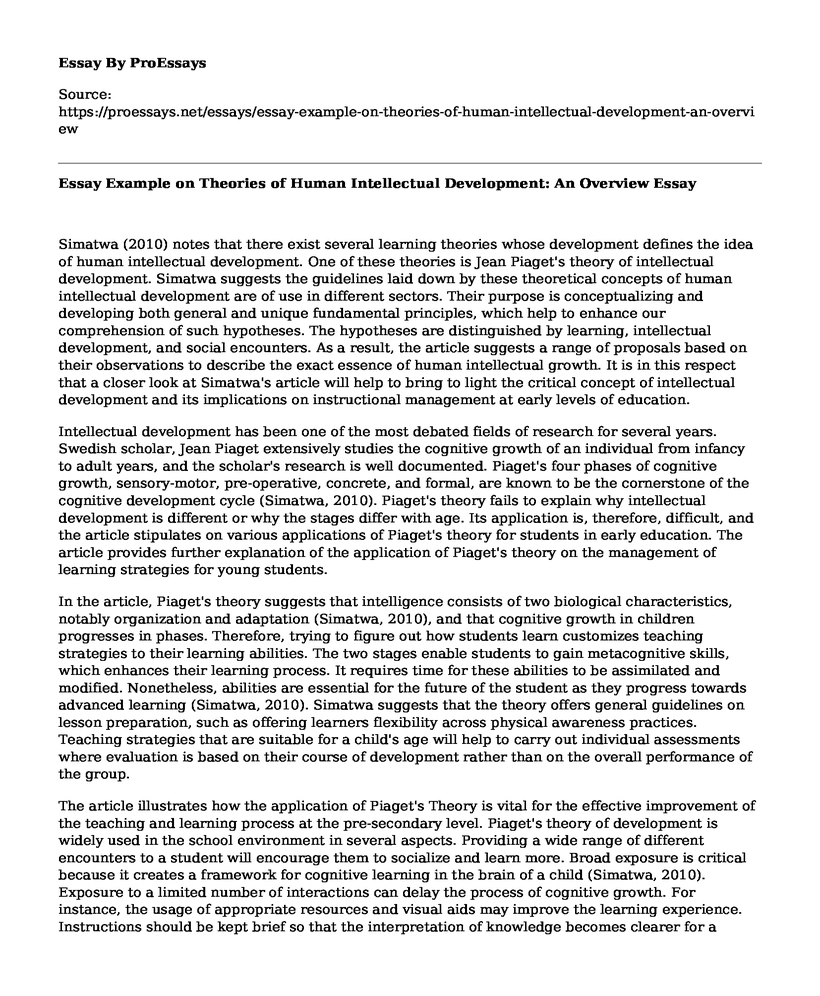Simatwa (2010) notes that there exist several learning theories whose development defines the idea of human intellectual development. One of these theories is Jean Piaget's theory of intellectual development. Simatwa suggests the guidelines laid down by these theoretical concepts of human intellectual development are of use in different sectors. Their purpose is conceptualizing and developing both general and unique fundamental principles, which help to enhance our comprehension of such hypotheses. The hypotheses are distinguished by learning, intellectual development, and social encounters. As a result, the article suggests a range of proposals based on their observations to describe the exact essence of human intellectual growth. It is in this respect that a closer look at Simatwa's article will help to bring to light the critical concept of intellectual development and its implications on instructional management at early levels of education.
Intellectual development has been one of the most debated fields of research for several years. Swedish scholar, Jean Piaget extensively studies the cognitive growth of an individual from infancy to adult years, and the scholar's research is well documented. Piaget's four phases of cognitive growth, sensory-motor, pre-operative, concrete, and formal, are known to be the cornerstone of the cognitive development cycle (Simatwa, 2010). Piaget's theory fails to explain why intellectual development is different or why the stages differ with age. Its application is, therefore, difficult, and the article stipulates on various applications of Piaget's theory for students in early education. The article provides further explanation of the application of Piaget's theory on the management of learning strategies for young students.
In the article, Piaget's theory suggests that intelligence consists of two biological characteristics, notably organization and adaptation (Simatwa, 2010), and that cognitive growth in children progresses in phases. Therefore, trying to figure out how students learn customizes teaching strategies to their learning abilities. The two stages enable students to gain metacognitive skills, which enhances their learning process. It requires time for these abilities to be assimilated and modified. Nonetheless, abilities are essential for the future of the student as they progress towards advanced learning (Simatwa, 2010). Simatwa suggests that the theory offers general guidelines on lesson preparation, such as offering learners flexibility across physical awareness practices. Teaching strategies that are suitable for a child's age will help to carry out individual assessments where evaluation is based on their course of development rather than on the overall performance of the group.
The article illustrates how the application of Piaget's Theory is vital for the effective improvement of the teaching and learning process at the pre-secondary level. Piaget's theory of development is widely used in the school environment in several aspects. Providing a wide range of different encounters to a student will encourage them to socialize and learn more. Broad exposure is critical because it creates a framework for cognitive learning in the brain of a child (Simatwa, 2010). Exposure to a limited number of interactions can delay the process of cognitive growth. For instance, the usage of appropriate resources and visual aids may improve the learning experience. Instructions should be kept brief so that the interpretation of knowledge becomes clearer for a young learner.
Conclusion
Simatwa explores a case analysis of individuals in their earlier years in comparison to their intellectual development later in adulthood. The postulations of the article aim at applying Piaget's theory in the education field for instructional management. Concerning the expediency of the topics under consideration, Simatwa's article provides a strong argument in that it discusses concrete problems that concern educational curriculums and goes on to link these topics to the core principles of the theory, ultimately proposing realistic solutions. Development theories influence the development of curriculum systems providing a systematic approach to research intellectual development and behavior. The article presents a case study on how each stage of intellectual development involves educational management for children at different stages of learning.
Reference
Simatwa, E. M. (2010). Piaget's theory of intellectual development and its implication for instructional management at pre-secondary school level. Educational Research and Reviews, 5(7), 366.
Cite this page
Essay Example on Theories of Human Intellectual Development: An Overview. (2023, Sep 01). Retrieved from https://proessays.net/essays/essay-example-on-theories-of-human-intellectual-development-an-overview
If you are the original author of this essay and no longer wish to have it published on the ProEssays website, please click below to request its removal:
- Time Management Tips for Learners
- My Biography as a Marriage and Family Therapy Paper Example
- Why College Is for Everyone Essay Example
- Essay Example on Teen Identity Formation: Exploring Music and Collective Identity
- Essay Sample on Immigrants: Speak English to Experience USA Culture
- Grandma's Delicious Recipes: My Baking Journey with My Grandmother - Paper Sample
- Free Report Example on Communication Challenge







